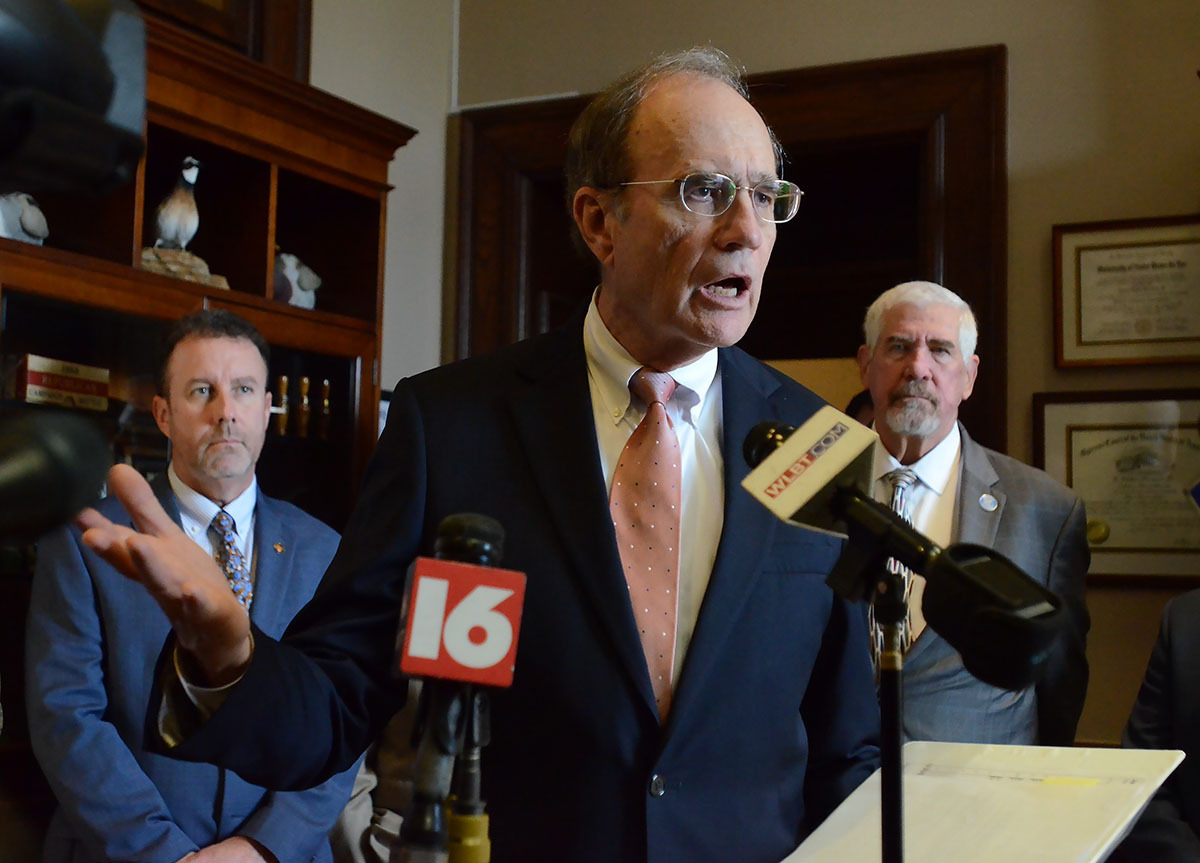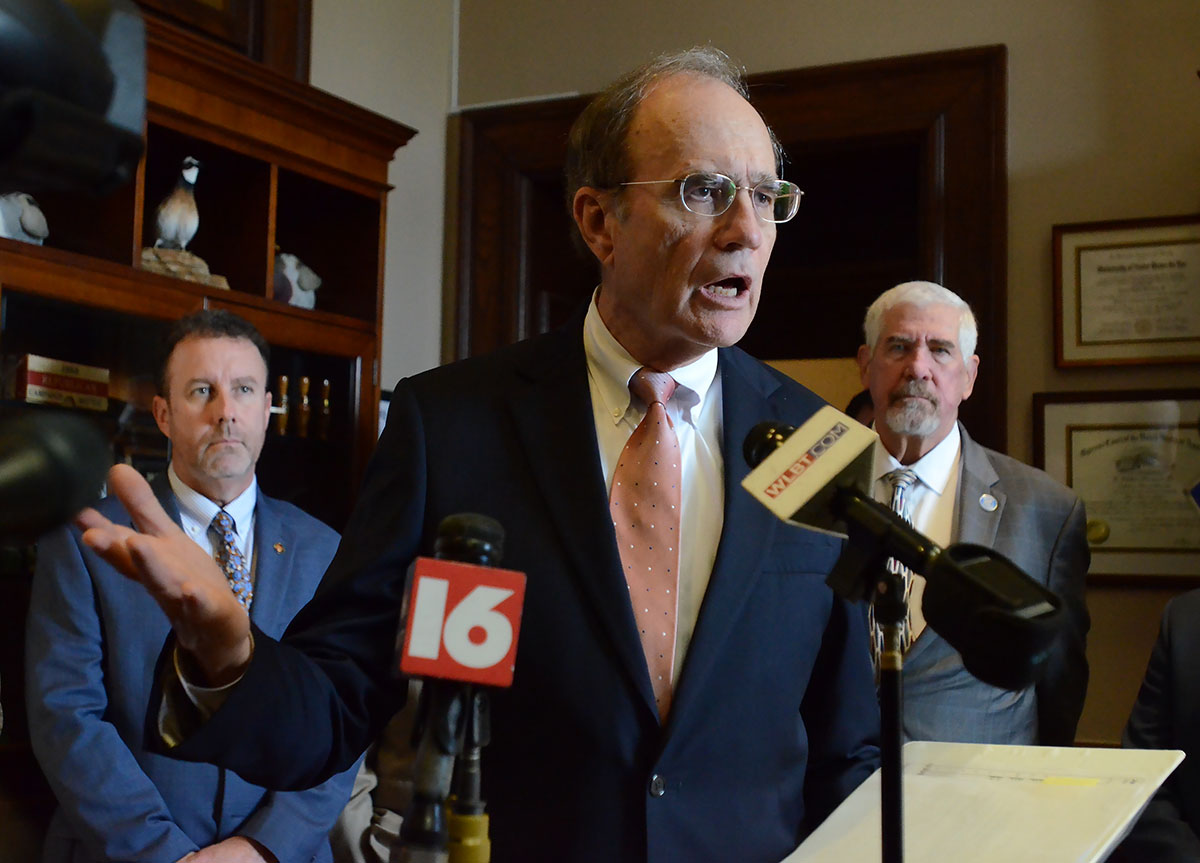Mississippi Today
Senate, in 11th hour, tries to revive ballot initiative measure it previously killed


Senate, in 11th hour, tries to revive ballot initiative measure it previously killed
The Senate on Monday, at Lt. Gov. Delbert Hosemann’s request, voted to revive a measure it killed last week that would restore voters’ right to sidestep the Legislature and put issues on a statewide ballot.
“At my request, the Senate passed a suspension resolution to revive the initiative process (Monday) morning,” Hosemann said in a statement. “House leadership has also expressed a desire to continue working on this issue. If the House agrees to this suspension resolution, the Senate will again address legislation providing Mississippians with direct input on policy. We are hopeful to come to a final agreement before (the legislative session ends).”
As the 2023 legislative session enters what’s scheduled to be its final few days, the House would have to follow suit with a two-thirds vote to suspend rules and revive the ballot initiative measure. Then the two chambers would have to come to agreement on a final version.
But House Speaker Philip Gunn said he would need more information before deciding whether the House would take up the Senate proposal to suspend the rules to pass an initiative proposal. He said the House had passed two initiative proposals – one last year and another this year – and both had been rejected by Senate leaders.
“We are clear on our position,” Gunn said. Unless the position in the Senate had changed on the initiative, Gunn asked, “What would be accomplished?” by taking up the rules suspension resolution.
In general, Gunn said he does not like such rules suspension resolutions because they could be used to try to revive other bills that had died earlier in the legislative process.
Citing irreconcilable differences between House and Senate positions, Senate Accountability Efficiency and Transparency Chairman John Polk, R-Hattiesburg, let the ballot initiative measure die with a deadline without a full Senate vote last week. A similar measure died in the Legislature without a final vote last year, after the state Supreme Court in 2021 shot down the ballot initiative right Mississippi voters had for three decades.
Hosemann last week said he was in favor of restoring the right — which is popular with voters according to recent polling — but that he lets his chairmen, such as Polk, make their own decisions.
The death of the bill drew bipartisan criticism, including from Hosemann’s challenger in the lieutenant governor GOP primary Sen. Chris McDaniel. If it stands, the bill’s death is likely to be an issue with voters in this year’s statewide elections.
READ MORE:Is ballot initiative a ‘take your picture off the wall’ issue for lawmakers?
Many Mississippians were angry when the state’s high court stripped voters of this right in 2021. This was in a ruling on a medical marijuana initiative voters had overwhelmingly passed, taking matters in hand after lawmakers had dallied for years on the issue. Legislative leaders were quick at the time with vows they would restore this right to voters, fix the legal glitches that prompted the Supreme Court to rule it invalid. Many lawmakers said they support the right.
The House and Senate versions of the measure, which would have required ratification by voters in November, differed. But both would have greatly restricted voters’ right to ballot initiative compared to the process that had been in place since 1992. Many supporters of restoring the right have been angered about legislative leaders’ proposals to date. In the House, most Democrats despite supporting restoration of the right voted “present” on the House version they found it so restrictive.
House Minority Leader Robert Johnson, D-Natchez, said if a bill is passed this session restoring the initiative, it should be a “clean” proposal that requires the same number of signatures to get an issue on the ballot as the initiative process that was struck down by the Supreme Court. Johnson said the proposal should not ban issues, such as abortion, from being taken up through the initiative process as was in the most recent House version.
The Senate position on the initiative would require the signatures of at least 240,000 registered voters to place an issue on a statewide ballot. The House version would require about 106,000, nearer the previous threshold required for the last 30 years.
Under both proposals, the Legislature by a simple majority vote could change or repeal an initiative approved by the electorate. Unlike the previous process voters had for decades, voters could only pass or change state laws, not the state constitution.
READ MORE: Senate kills Mississippi ballot initiative without a vote
Senate President Protem Dean Kirby, who proposed the rules suspension to revive the measure, on Monday said he believes many senators still support the higher signature threshold but, “Hopefully we can work out some kind of compromise.”
“We all want something passed,” Kirby said. “I think a lot of people out there do want a ballot initiative and we are going to make an effort.”
A recentMississippi Today/Siena College pollshows Mississippi voters across the spectrum want their right to put issues directly on a statewide ballot restored.
The poll showed 72% favor reinstating ballot initiative, with 12% opposed and 16% either don’t know or have no opinion. Restoring the right garnered a large majority among Democrats, Republicans, independents and across all demographic, geographic and income lines.
Rep. Sam Creekmore, R-New Albany, heard about the Senate’s attempt to revive the measure as he walked off the House floor Monday afternoon.
“Good,” Creekmore said. “Let’s get it done.”
This article first appeared on Mississippi Today and is republished here under a Creative Commons license.
Did you miss our previous article…
https://www.biloxinewsevents.com/?p=228888
Mississippi Today
On this day in 1939, Billie Holiday recorded ‘Strange Fruit’

April 20, 1939

Legendary jazz singer Billie Holiday stepped into a Fifth Avenue studio and recorded “Strange Fruit,” a song written by Jewish civil rights activist Abel Meeropol, a high school English teacher upset about the lynchings of Black Americans — more than 6,400 between 1865 and 1950.
Meeropol and his wife had adopted the sons of Julius and Ethel Rosenberg, who were orphaned after their parents’ executions for espionage.
Holiday was drawn to the song, which reminded her of her father, who died when a hospital refused to treat him because he was Black. Weeks earlier, she had sung it for the first time at the Café Society in New York City. When she finished, she didn’t hear a sound.
“Then a lone person began to clap nervously,” she wrote in her memoir. “Then suddenly everybody was clapping.”
The song sold more than a million copies, and jazz writer Leonard Feather called it “the first significant protest in words and music, the first unmuted cry against racism.”
After her 1959 death, both she and the song went into the Grammy Hall of Fame, Time magazine called “Strange Fruit” the song of the century, and the British music publication Q included it among “10 songs that actually changed the world.”
David Margolick traces the tune’s journey through history in his book, “Strange Fruit: Billie Holiday and the Biography of a Song.” Andra Day won a Golden Globe for her portrayal of Holiday in the film, “The United States vs. Billie Holiday.”
This article first appeared on Mississippi Today and is republished here under a Creative Commons Attribution-NoDerivatives 4.0 International License.![]()
Mississippi Today
Mississippians are asked to vote more often than people in most other states

Not long after many Mississippi families celebrate Easter, they will be returning to the polls to vote in municipal party runoff elections.
The party runoff is April 22.
A year does not pass when there is not a significant election in the state. Mississippians have the opportunity to go to the polls more than voters in most — if not all — states.
In Mississippi, do not worry if your candidate loses because odds are it will not be long before you get to pick another candidate and vote in another election.
Mississippians go to the polls so much because it is one of only five states nationwide where the elections for governor and other statewide and local offices are held in odd years. In Mississippi, Kentucky and Louisiana, the election for governor and other statewide posts are held the year after the federal midterm elections. For those who might be confused by all the election lingo, the federal midterms are the elections held two years after the presidential election. All 435 members of the U.S. House and one-third of the membership of the U.S. Senate are up for election during every midterm. In Mississippi, there also are important judicial elections that coincide with the federal midterms.
Then the following year after the midterms, Mississippians are asked to go back to the polls to elect a governor, the seven other statewide offices and various other local and district posts.
Two states — Virginia and New Jersey — are electing governors and other state and local officials this year, the year after the presidential election.
The elections in New Jersey and Virginia are normally viewed as a bellwether of how the incumbent president is doing since they are the first statewide elections after the presidential election that was held the previous year. The elections in Virginia and New Jersey, for example, were viewed as a bad omen in 2021 for then-President Joe Biden and the Democrats since the Republican in the swing state of Virginia won the Governor’s Mansion and the Democrats won a closer-than-expected election for governor in the blue state of New Jersey.
With the exception of Mississippi, Louisiana, Kentucky, Virginia and New Jersey, all other states elect most of their state officials such as governor, legislators and local officials during even years — either to coincide with the federal midterms or the presidential elections.
And in Mississippi, to ensure that the democratic process is never too far out of sight and mind, most of the state’s roughly 300 municipalities hold elections in the other odd year of the four-year election cycle — this year.
The municipal election impacts many though not all Mississippians. Country dwellers will have no reason to go to the polls this year except for a few special elections. But in most Mississippi municipalities, the offices for mayor and city council/board of aldermen are up for election this year.
Jackson, the state’s largest and capital city, has perhaps the most high profile runoff election in which state Sen. John Horhn is challenging incumbent Mayor Chokwe Antar Lumumba in the Democratic primary.
Mississippi has been electing its governors in odd years for a long time. The 1890 Mississippi Constitution set the election for governor for 1895 and “every four years thereafter.”
There is an argument that the constant elections in Mississippi wears out voters, creating apathy resulting in lower voter turnout compared to some other states.
Turnout in presidential elections is normally lower in Mississippi than the nation as a whole. In 2024, despite the strong support for Republican Donald Trump in the state, 57.5% of registered voters went to the polls in Mississippi compared to the national average of 64%, according to the United States Elections Project.
In addition, Mississippi Today political reporter Taylor Vance theorizes that the odd year elections for state and local officials prolonged the political control for Mississippi Democrats. By 1948, Mississippians had started to vote for a candidate other than the Democrat for president. Mississippians began to vote for other candidates — first third party candidates and then Republicans — because of the national Democratic Party’s support of civil rights.
But because state elections were in odd years, it was easier for Mississippi Democrats to distance themselves from the national Democrats who were not on the ballot and win in state and local races.
In the modern Mississippi political environment, though, Republicans win most years — odd or even, state or federal elections. But Democrats will fare better this year in municipal elections than they do in most other contests in Mississippi, where the elections come fast and often.
This article first appeared on Mississippi Today and is republished here under a Creative Commons Attribution-NoDerivatives 4.0 International License.
Mississippi Today
On this day in 1977, Alex Haley awarded Pulitzer for ‘Roots’

April 19, 1977

Alex Haley was awarded a special Pulitzer Prize for “Roots,” which was also adapted for television.
Network executives worried that the depiction of the brutality of the slave experience might scare away viewers. Instead, 130 million Americans watched the epic miniseries, which meant that 85% of U.S. households watched the program.
The miniseries received 36 Emmy nominations and won nine. In 2016, the History Channel, Lifetime and A&E remade the miniseries, which won critical acclaim and received eight Emmy nominations.
This article first appeared on Mississippi Today and is republished here under a Creative Commons Attribution-NoDerivatives 4.0 International License.![]()
-

 News from the South - Alabama News Feed6 days ago
News from the South - Alabama News Feed6 days agoFoley man wins Race to the Finish as Kyle Larson gets first win of 2025 Xfinity Series at Bristol
-

 News from the South - Alabama News Feed7 days ago
News from the South - Alabama News Feed7 days agoFederal appeals court upholds ruling against Alabama panhandling laws
-

 News from the South - Missouri News Feed5 days ago
News from the South - Missouri News Feed5 days agoAbandoned property causing issues in Pine Lawn, neighbor demands action
-

 News from the South - Missouri News Feed3 days ago
News from the South - Missouri News Feed3 days agoDrivers brace for upcoming I-70 construction, slowdowns
-

 News from the South - North Carolina News Feed5 days ago
News from the South - North Carolina News Feed5 days agoFDA warns about fake Ozempic, how to spot it
-

 News from the South - Virginia News Feed5 days ago
News from the South - Virginia News Feed5 days agoLieutenant governor race heats up with early fundraising surge | Virginia
-

 News from the South - Oklahoma News Feed4 days ago
News from the South - Oklahoma News Feed4 days agoThursday April 17, 2025 TIMELINE: Severe storms Friday
-

 News from the South - Arkansas News Feed7 days ago
News from the South - Arkansas News Feed7 days agoTwo dead, 9 injured after shooting at Conway park | What we know

















































